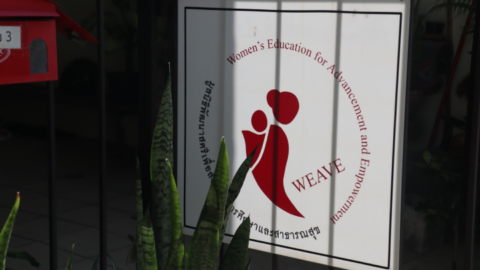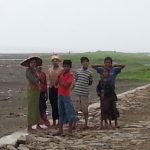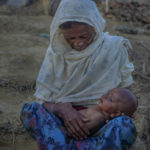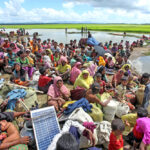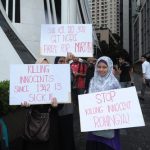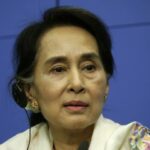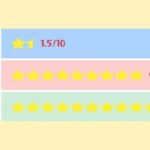Empowering Myanmar’s Indigenous Refugee Women: An Interview With the WEAVE Foundation’s Mitos Urgel
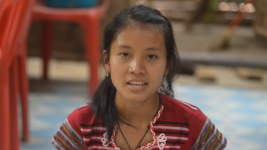
WEAVE Women operates a series of development projects, which aim to empower women from Indigenous minorities, who’ve fled across the border from Myanmar into north-western Thailand and are currently living in refugee camps along the border.
Headquartered in Thailand’s second largest city Chiang Mai, the WEAVE Foundation has a team of seven development workers, who operate within two camps, Nai Soi and Mae Su Rin, in Khun Yuan district around the Myanmar border region.
Run by the Thai government, the refugee camps are home to about 15,000 displaced people, the majority of whom are Karennis from the state of Kayah in north-eastern Myanmar, as well as Karen people, who are indigenous to the same region.
A low-level civil war between the Karreni people and the Myanmar ruling military junta has been ongoing for six decades.
Fighting picked up in February last year, following the junta retook control of the country in a coup, which saw 180,000 locals, half Kayah’s population, fleeing to safety.
WEAVE (Women’s Education for Advancement and Empowerment)
The social enterprise WEAVE Fair Trade commenced operation in 1990, with the aim of empowering Indigenous minorities, and upholding their rights. And in 1994, it began building relationships with refugee organisations, with the aim of focusing on women and children fleeing Myanmar.
The main WEAVE program aims to enable Indigenous women artisans to become the drivers of change within their communities. And as the nongovernment organisation is based upon fair trade principles, the women earn a good income to provide for their families.
The Karenni women participating in the WEAVE social enterprise also have a focus on seeing their children receive a better education, as this will ensure their entire community will have an improved future, especially when it’s time to return to their homes in Myanmar.
The program WEAVE runs for these women not only builds capacity in terms of producing products, but they provide knowledge and skills in the areas of microcredit, microfinance, small business development and marketing.
Fair trade principles
WEAVE financial officer Ms Ju provided a tour of the foundation’s Chiang Mai showroom, where she explained that the products made in the refugee camps are sold right around the globe and in accordance with the principles of the World Fair Trade Organisation.
The products produced by the women include a range of woven fabrics, such as scarves, wall hangings, stuffed toys and clothing, along with cane products, like hats and baskets.
Sydney Criminal Lawyers spoke to WEAVE Foundation president Mitos Urgel about the principles that underpin her social enterprise, the projects the foundation runs beyond the production of goods for trading, and what she envisages as the future for the Karenni refugee women.
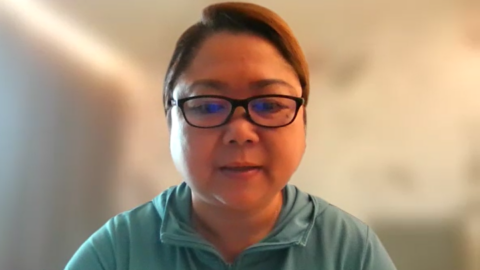
The WEAVE Foundation is a nongovernment organisation that assists Indigenous refugees from Myanmar, in camps along the north-western Thai border.
Mitos, what sort of work does WEAVE carry out with these women?
WEAVE is working mainly with women and children, in providing protection, as well as in extending nonformal education and providing economic empowerment programs.
The work that we have with ethnic women is around income generation and development of fair-trade principles. The work that we are doing with them stalled, especially during COVID, but also when the political upheaval took place in Myanmar.
Basically, our assistance is in terms of product development and design, along with fair trade intervention.
The Indigenous women you’re helping are living in refugee camps.
The intervention that we’re providing is not only contained to the refugee camps. We also collaborate with surrounding host communities in Thailand.
In the northern part of Thailand, where we’re largely operating, we collaborate with several Thai villages. They belong to these ethnic Indigenous communities, and they’re poor rural people.
They live close to the refugee camps. So, we have an intervention that provides opportunity for these women as well.
The women in the Thai villages are very close to the forest, so they collect natural colours there because in the fair-trade operations, we do natural dying.
So, these women have access to these resources. They do natural dying, and this product is then sent to the refugee camps, so that the women who don’t have access to these resources, then have the raw materials that they can use to weave.
The Indigenous people from Myanmar live more traditional lives compared to the majority in that country. How would you describe their situation in their homeland?
The refugees are extremely marginalised. They are pushed to the borders. They don’t have access to education. They’re stateless. They’re unable to access work and further education beyond what is being provided in the camps.
The Thai community that we work with come from remote and poor villages. They are Thai, but in terms of access to employment, they receive less than a dollar a day.
WEAVE has a focus on empowering women from these ethnic minorities. Why the particular focus on women?
Basically, because their needs are unattended. WEAVE’s focus is in providing access to rights. We have a strong focus on a rights-based approach, in extending rights for survival, for protection and participation.
The communities we’re working with are unable to have access to rights, mainly because of their status. Most of them are nonliterate: they don’t know how to read or write. So, they’re unable to have access to these opportunities.
We feel it’s important that we’re able to provide support to them. This is not only in terms of income. It’s really in terms of their inability to be heard. They’re invisible. They don’t have a voice. That puts them in a very difficult situation.
So, WEAVE is working towards trying to bring up the level of knowledge and competency of these women, because until their status is able to be elevated, they won’t be able to participate in any decision-making or problem solving for their community.
That’s why it’s crucial that we can assist them, so in turn, they’re able to support their communities and their families.
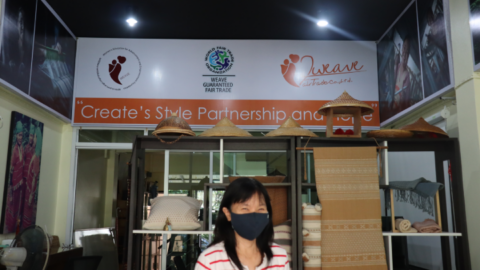
WEAVE Women runs a number of projects. What do they involve?
We’re mainly focused on the development of women and their children. We believe women are strong movers and catalysts for change.
So, our program with women includes economic empowerment. We provide capacity building skills and training to improve livelihoods, which is centred around fair trade.
We also have education programs for girls and young people. We run community schools that provide space for youngers between 15 to 21.
We have a women’s study program that focuses on women’s issues, community development and peace and conflict transformation.
We also have programs for young boys after high school. This is a two-year program, which allows these young people to have community schooling and prepare them for what they want to do after school to support their communities.
We run leadership camps. We assist young people, as part of their preparation for their future role as potential community leaders.
We also support mother tongue-based community education for children below 5 years old. We run a nursery school, but these are preschools.
So, children are provided with some form of supplementary feeding program in order to improve their nutrition, as well as providing a space in order to assist in building their foundation to prepare them for when they enter basic education.
We’re using the mother tongue base as foundational development for these children.
We also have teacher training. Our approach is we do the training of trainers, so people in the community are being trained in the hope that they can sustain themselves in the future.
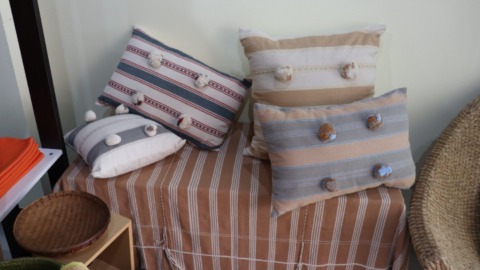
The WEAVE Foundation has been operating for over three decades now. What sort of impact has it had?
It’s impacted in multiple areas, I am proud to say. The intervention that we’re doing is very realistic, because it’s close to the heart of the people.
The women that we’re working with have been empowered at the household level, wherein they become the main breadwinners, because the men are in a conflict situation.
There is a war going on in Myanmar, which the men are fighting. So, it’s left to the care of the women to provide food for their family and education for their children.
So, in the area of women’s economic empowerment, we’re able to provide safe and fair income for women, without leaving the confines of their room.
It’s home-based income generation, which provides not only the ability to provide food for their family, but to be able to participate in decision-making.
By and large, women are taking the leadership role and they have the voice now. It’s a very strong impact we’ve created.
But, in parallel to that, one of the impacts of the fair-trade project is, when women come to it, they’ve been subjected to multiple violences in their lives, whether this is state violence or domestic violence.
The women make textiles. They’re natural weavers, but we teach them different techniques and colours.
So, when they join the project, you can just imagine the anger of the women. And we have observed that when they start weaving the materials, which are very hard, the anger that they’re exerting sees the textiles become much softer.
What I’m saying is the women are starting to get connected and they have more focus. This work is not just a mechanical thing for them to do. They’re weaving in order to have an income, but actually, they’re healing themselves as well.
They’re weaving the beautiful patterns of their lives into the process, into the pieces that they’re making, because that’s the only way that they’re free to dream of the future.
As people who have been displaced and abused, it’s very difficult. They’re in a difficult position, but the weaving project – the income generation activity, the sewing and weaving – is assisting them to at least dream for a future for their children.
You’re talking about the future of these women who’ve fled civil war. So, what do you foresee for them after they’ve participated in WEAVE Women?
What’s essential for us is that we see WEAVE as a vehicle. We are just catalysts.
We hope one day, when it is safe for them to return, that they will have the capacity and competency, so when they go back, they’re able to rebuild their lives. For us, that’s very important.
For those who are unable to return because it’s not safe for them, and if they’re able to secure some political asylum to settle in other countries, then they will have the skills and a certain level of empowerment, where they’re able to protect themselves in alien situations.
It’s about the capacity for them to be able to decide for themselves, and no longer for NGOs or their leaders standing there telling them what they need.
It’s for them to take the lead and go and do what’s best for them.
And lastly, Mitos, how can people help?
There are many ways where assistance can be provided. In all aspects of the work, whether it’s financial, material or human resources.
We accept a lot of interns and volunteers who are willing to assist in the work that we are doing. We also receive some donations and financial assistance.
We are proud to say that WEAVE is not necessarily doing relief, although we are working in a humanitarian context.
We do a lot of development work, but also, as part of our fair-trade work, we go for trade, not aid.
So, we believe that ensuring that communities become more self-reliant and are able to have the skills to become independent, especially women, is essential.
WEAVE is creating the space and the market in order for them to be able to bring the beautiful products that they’re creating to the global market, and as part of their advocacy as well.
